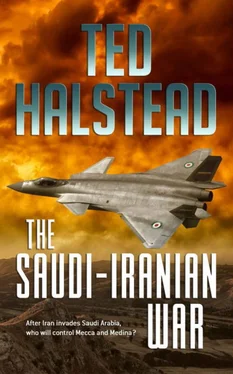Ted Halstead - The Saudi-Iranian War
Здесь есть возможность читать онлайн «Ted Halstead - The Saudi-Iranian War» весь текст электронной книги совершенно бесплатно (целиком полную версию без сокращений). В некоторых случаях можно слушать аудио, скачать через торрент в формате fb2 и присутствует краткое содержание. Год выпуска: 2019, Издательство: Independently published, Жанр: Боевая фантастика, Триллер, на английском языке. Описание произведения, (предисловие) а так же отзывы посетителей доступны на портале библиотеки ЛибКат.
- Название:The Saudi-Iranian War
- Автор:
- Издательство:Independently published
- Жанр:
- Год:2019
- ISBN:нет данных
- Рейтинг книги:4 / 5. Голосов: 1
-
Избранное:Добавить в избранное
- Отзывы:
-
Ваша оценка:
- 80
- 1
- 2
- 3
- 4
- 5
The Saudi-Iranian War: краткое содержание, описание и аннотация
Предлагаем к чтению аннотацию, описание, краткое содержание или предисловие (зависит от того, что написал сам автор книги «The Saudi-Iranian War»). Если вы не нашли необходимую информацию о книге — напишите в комментариях, мы постараемся отыскать её.
The Saudi-Iranian War — читать онлайн бесплатно полную книгу (весь текст) целиком
Ниже представлен текст книги, разбитый по страницам. Система сохранения места последней прочитанной страницы, позволяет с удобством читать онлайн бесплатно книгу «The Saudi-Iranian War», без необходимости каждый раз заново искать на чём Вы остановились. Поставьте закладку, и сможете в любой момент перейти на страницу, на которой закончили чтение.
Интервал:
Закладка:
The rifle used compressed air cartridges that were impossible to find in stores open to Egyptian civilians, but relatively easy to find in Europe. The dozen rounds he had taken with him when he had left the Mukhabarat were irreplaceable because they had been developed in Egypt by government scientists. Using tetrodotoxin extracted from the yellow boxfish, commonly found in the Red Sea waters off the Egyptian coast, they had developed a round that could somewhat reliably immobilize the target, while still leaving him alive for questioning.
In his training, the sniper had been warned about three variables. The first was body mass. A small man, or even worse a child, could die from respiratory arrest or a heart attack provoked by the toxin.
The second was allergic reaction. A small but unknown percentage of subjects would die from even limited exposure to tetrodotoxin.
The sniper wasn’t worried about the first variable once he saw the size of the two muscular men who had been following Abdul and Farhad. There was nothing he could do about the second variable. The third factor he could control. Where on their body the round would impact.
The first shot was perfect. It impacted without a sound in the first man’s lower back, and he dropped like a stone.
Unfortunately, the second man’s reflexes were excellent, and he wheeled around and was looking up towards the third-floor window where the sniper had just fired his second round. As a result, the round impacted about an inch below his heart.
The sniper had no way to know for sure whether the man was dead when he fell. But his guess that he was turned out to be correct.
As planned, the sniper had already turned from the window and begun disassembling his rifle when four men emerged from one of the doors lining the alley to take the two men inside. He hadn’t been told why it was necessary to shoot the two men, why it was worth trying to capture them alive, or what would happen to them now.
The sniper shrugged. He would be the first to admit he had no better reason than curiosity for wanting to know.
Anatoly Grishkov and Alexei Vasilyev both looked as though they needed the support of the sturdy red leather sofa to cope with the meal they had just consumed. As well as the vodka toasts that had followed. Their host, FSB
Director Smyslov, smiled at them benevolently over a glass of strong black tea.
Grishkov had been told many times that he looked like his father, who had also been a policeman. Like him, he was shorter and more muscular than the average Russian, with thick black hair and black eyes. His wife Arisha said that his face gained more ‘character’ every year, whatever that meant. Since she patted his face when she said it and gave him a kiss, he didn’t mind. His son Sasha was thirteen and his other son Misha was eleven, and though both had black hair otherwise they thankfully looked more like Arisha.
Circumstances had thrown Grishkov together with FSB Colonel Alexei Vasilyev on their last mission. Following that success, Smyslov decided to make Grishkov Alexei’s partner. That had meant giving up his job as the lead homicide detective for the entire Vladivostok region, and being put on “indefinite special assignment”, though he was now on the books as a Captain in the Moscow Police Department. It looked like Grishkov was about to find out what that meant in practice.
Grishkov thought Vasilyev was at least a decade older than his age of forty-three, but in fact he was even older. Vasilyev was still in excellent physical condition, in part because unlike most Russian men his age he rarely drank alcohol, and because he regularly practiced his hand-to-hand combat skills. At the FSB’s gym many younger agents had learned painful lessons about the value of experience over youth. Since these skills had kept Vasilyev alive in the field more than once, he took keeping them up-to-date very seriously.
Vasilyev was about a head taller than Grishkov, but thinner. His true age was disguised in part by a full head of dark brown hair, which showed no signs of thinning. On his last mission he’d told Grishkov that he didn’t even have a dog in his apartment, which was a true statement. Vasilyev had seen several agents suffer because the enemy decided to use family against them, and indeed that had happened to Grishkov during their last mission.
“So, I hope you are both sufficiently fortified to let us begin with your mission briefing,” Smyslov said, his smile widening.
Vasilyev and Grishkov both nodded, and Vasilyev added, “I thought that the feast you laid on after we finished our last mission couldn’t be surpassed, but you proved me wrong.”
Smyslov’s laugh rumbled from a frame that Grishkov thought for perhaps the tenth time helped explain the foreign stereotype of the Russian bear. “I’m sending my two favorite agents to a region where decent food and drink are hard to come by, so the memory of this meal will have to sustain you for some time. Nobody should have to face cardamom coffee without some reinforcement!”
Vasilyev smiled wryly. “On that point we’re in complete agreement. So, the Middle East then?”
Smyslov’s smile disappeared. “Yes. I had thought originally to send you both straight to Iran, but it looks like you’ll need to go to Saudi Arabia first.”
Vasilyev nodded. “Good. My Arabic was always better than my Farsi. This will give me more time to prepare.”
Smyslov grinned and pointed at Grishkov. “And how has your Arabic refresher course been going?”
Grishkov scowled, and shook his head. “Refresher is the wrong word. I was one of a handful of soldiers in Chechnya who learned enough Arabic to make out most of what we overheard from foreign fighters using handheld radios. But the vocabulary we learned was limited to what we were likely to hear on the battlefield. So, if anyone is setting up an ambush within earshot, I’ll know. Polite dinner conversation, not so much.”
Smyslov laughed and shook his head. “My friend, as usual you are too modest. Your instructors tell me you have made remarkable progress, and are the most motivated student they have ever seen.”
Grishkov blinked, and then shrugged. “I’d like to make it back to Arisha and the kids.”
Smyslov nodded. “Of course you shall. But I’d be lying if I didn’t tell you the vocabulary you remember from Chechnya may come in handy.”
Vasilyev frowned. “So, our target is aware of our interest?”
Smyslov sighed. “Possibly. The men we had following them both disappeared, and our efforts to locate them have failed. We have to assume they were captured, and were forced to tell the target everything we know. Both fortunately and unfortunately, that’s not much.”
Grishkov’s and Vasilyev’s eyebrows both rose, but they said nothing.
Smyslov shrugged. “So, here’s what we know, and what we suspect. We know that an unknown organization is gathering men and weapons for the purpose of overthrowing the Saudi monarchy. We know that they have help from elements of the Iranian government. We know that they have been planning their attack for over a year, and that the attack will happen soon.”
Smyslov paused. “That’s what we know. We suspect that Iraq may also be involved. We suspect that the attack will be on Saudi oil production, and that there may be another target as well. I have been informed by the President himself that preventing these attacks is a top national priority, and that we may request any resources necessary towards this goal.”
Grishkov and Vasilyev looked at each other, but said nothing.
Smyslov nodded. “You’re wondering why we care so much about an Arab monarchy that has been America’s closest Middle Eastern ally for generations. In fact, it was just before the collapse of the Soviet Union that we resumed diplomatic relations after a gap of over fifty years. Why the Saudis are important to us is a complex matter.”
Читать дальшеИнтервал:
Закладка:
Похожие книги на «The Saudi-Iranian War»
Представляем Вашему вниманию похожие книги на «The Saudi-Iranian War» списком для выбора. Мы отобрали схожую по названию и смыслу литературу в надежде предоставить читателям больше вариантов отыскать новые, интересные, ещё непрочитанные произведения.
Обсуждение, отзывы о книге «The Saudi-Iranian War» и просто собственные мнения читателей. Оставьте ваши комментарии, напишите, что Вы думаете о произведении, его смысле или главных героях. Укажите что конкретно понравилось, а что нет, и почему Вы так считаете.












